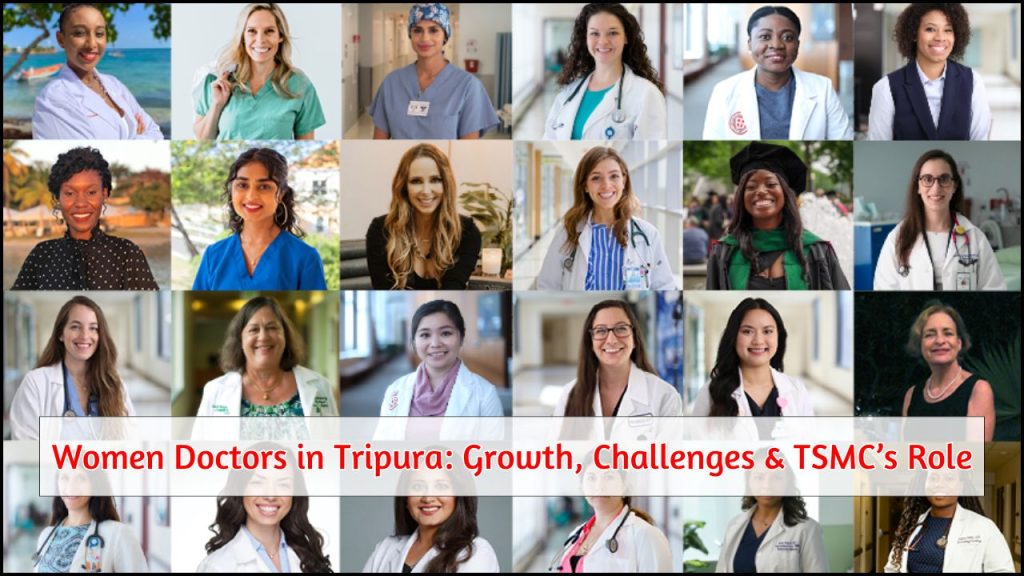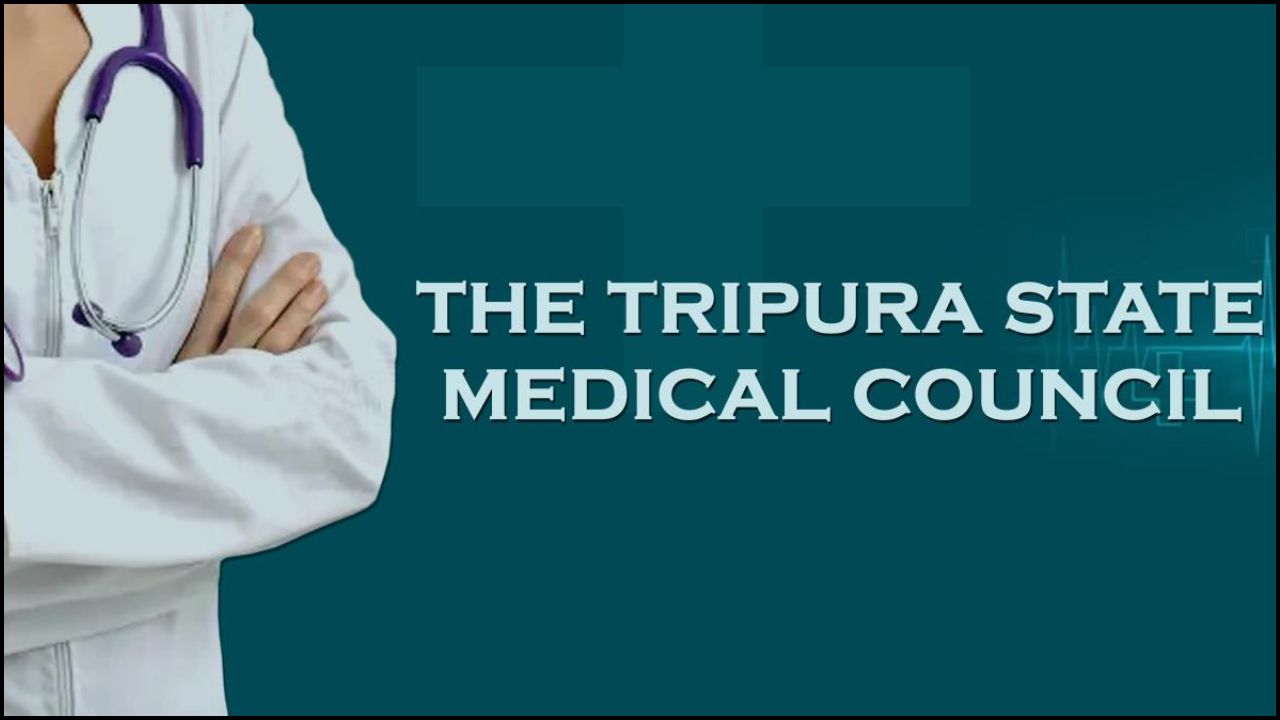
Women doctors in Tripura have been steadily growing in number and making significant contributions to the state’s healthcare system. This development shows the commitment of the region towards gender equality in the medical field. However, the journey has not been without challenges.
A range of social, educational, and infrastructural issues continues to impact the progress of female medical professionals. The Tripura State Medical Council (TSMC) has taken a vital role in addressing some of these concerns. This article presents a detailed overview of the current status, struggles, and contributions of women doctors in Tripura, along with TSMC’s initiatives to support them.
Table of Contents
Growth of Women Doctors in Tripura
- Medical College Admissions: A significant rise has been seen in the number of female students admitted to medical colleges across the state over the past decade.
- Workforce Participation: Increased participation of women in hospitals, clinics, and rural health centres has been observed.
- Postgraduate Specialization: A noticeable interest among female doctors in pursuing specialization in fields like gynecology, pediatrics, and psychiatry.
- Public Sector Employment: Government hospitals in Tripura employ a large number of women doctors who serve in both urban and rural areas.
- Private Clinics and Entrepreneurship: Several women doctors have started their clinics, diagnostic centres, and wellness centres in towns like Agartala and Dharmanagar.
Key Statistics
| Category | Details |
|---|---|
| Percentage of Women MBBS Students | Around 55% in recent batches |
| Total Registered Female Doctors | Nearly 1,200, as per recent TSMC data |
| Women in Government Service | Over 65% of female doctors work in the public sector |
| Specialized Female Practitioners | About 400 have completed postgraduate studies |
| Women-led Health Initiatives | 30+ clinics run by female doctors across Tripura |
Major Challenges Faced by Women Doctors
- Work-Life Balance: Family responsibilities, especially in rural households, often conflict with work schedules.
- Safety Concerns: Late-night shifts and emergency calls pose safety risks, especially in isolated or underdeveloped regions.
- Gender Bias in the Workplace: Unequal treatment and lesser opportunities in leadership roles affect professional growth.
- Lack of Mentorship: Limited guidance and networking options are available for young female professionals in the field.
- Infrastructure Gaps: Inadequate healthcare facilities in remote areas make it hard for women doctors to perform effectively.
Voices from the Field
| Name | Designation | Experience Shared |
|---|---|---|
| Dr. Mita Debbarma | General Physician, Udaipur | Faced family resistance initially, but now runs a full-time clinic. |
| Dr. Anjali Das | Pediatrician, Agartala | Expressed the need for better maternity leave policies in hospitals. |
| Dr. Rinita Saha | Surgeon, Tripura Medical College | Highlighted gender bias in surgery departments. |
TSMC’s Role in Supporting Women Doctors
- Medical License and Registration: TSMC ensures fair and smooth registration for all eligible medical graduates, including women.
- Workshops and Training: Specialized training programs on mental health, maternal care, and leadership for female practitioners.
- Grievance Redressal Mechanism: A complaint cell is functional to address issues related to workplace harassment and misconduct.
- Collaboration with Educational Institutes: Tie-ups with medical colleges for hosting seminars and guest lectures by senior women doctors.
- Encouragement of Research: Research grants and encouragement for publishing articles in medical journals are being provided.
Important TSMC Programs Benefiting Women Doctors
| Program Name | Objective | Impact on Women Doctors |
|---|---|---|
| Women in Medicine Forum | Create a platform for experience sharing | Boosted confidence and peer learning |
| Rural Healthcare Support | Deploy women doctors in village clinics | Strengthened female healthcare presence in rural areas |
| Continuing Medical Education (CME) | Regular updates on medical practices | Kept women doctors up-to-date with the latest developments |
| Gender Sensitization Drives | Address gender issues in hospitals | Improved workplace environment |
| Career Counseling for Girls | Encourage young girls to pursue medicine | Increased awareness and interest in the profession |
Government Schemes Complementing TSMC’s Work
- Tripura Health Service Recruitment: Female doctors are given preference under various reservation categories.
- Maternity and Child Health Programs: Special schemes employ women doctors in mission-mode projects.
- Digital Health Platforms: Telemedicine projects enable female doctors to consult patients from their homes.
- Scholarship for Girl Students: Financial support is provided to girls pursuing MBBS and other medical degrees.
- Skill Upgradation Programs: Government-funded training and certification programs for continuous learning.
Success Stories of Women Doctors in Tripura
| Doctor | Achievement |
|---|---|
| Dr. Lipika Paul | Set up one of the first teleconsultation clinics in Kailashahar |
| Dr. Sneha Bhattacharya | Appointed Dean of a private medical college in Agartala |
| Dr. Namrata Chakma | Conducted awareness camps on maternal health in tribal areas |
| Dr. Jharna Debnath | Known for her free weekend clinics in South Tripura |
Future Prospects and Recommendations
- Improved Hostel Facilities: Safe and affordable accommodations for female medical students must be built.
- Mentorship Networks: Strong mentorship programs can be established through partnerships with senior professionals.
- Flexible Work Schedules: Hospitals should offer flexible shifts to help women maintain work-life balance.
- Leadership Training: Women must be encouraged to take up administrative roles in healthcare institutions.
- Digital Infrastructure: Expansion of digital tools will allow remote consulting and reduce travel stress for women doctors.
The Way Forward
Women doctors in Tripura are shaping the future of healthcare through dedication, resilience, and excellence. The progress achieved so far reflects both the strength of these professionals and the supportive efforts by TSMC. Despite many challenges, consistent efforts by the state, TSMC, and the women themselves are leading to a stronger, more inclusive healthcare environment. Continued support and policy-level changes will further empower women in medicine, making Tripura a model for other states.





